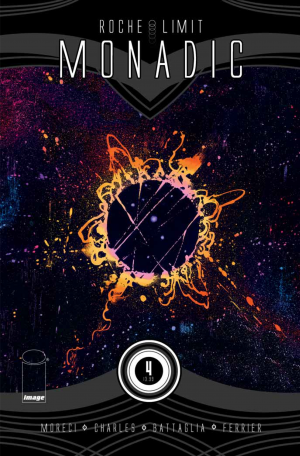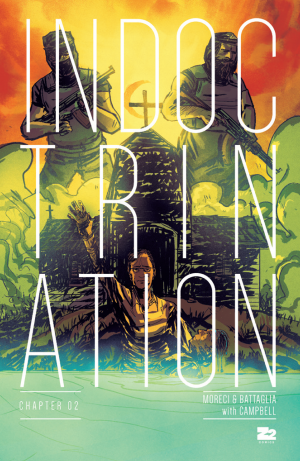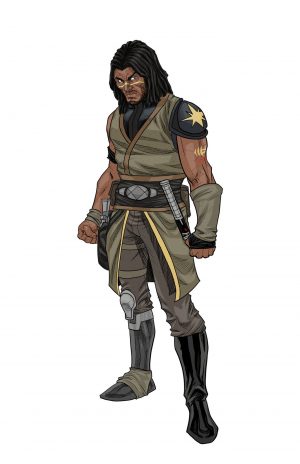Zeb Larson's Interview with Michael Moreci
Zeb Larson talks to creator Michael Moreci about Roche Limit, Sci-Fi and collaborating on different sides of the political fence.
ZEB LARSON: I actually feel like Roche Limit has become somewhat more hopeful throughout its run, and not just because we’ve lost Langford’s rather morose narration as the series has gone. Was that intentional, or am I just becoming optimistic?
MICHAEL MORECI: You're absolutely right. Ultimately, Roche Limit was a story about redemption, both intimately for each of our characters and also for humanity as well. The deeper we went into the series, the more the central idea became apparent—that one of the things that makes humanity so uniquely wonderful is our capacity to dedicate ourselves—and sacrifice ourselves, if need be—for the greater good. We have these systems of cooperation everywhere we look: families, government, churches, etc., and I firmly, firmly believe that we accomplish more together than we do on our own. The despair in those early issues come from Langford realizing what his failures—and humanity's failures—were, then finding strength to move beyond that.
ZL: If we’re making comparisons, part one of this series is Blade Runner, and part two is more akin to Aliens. How would you describe part three? Were the influences behind it different from what inspired the first two series?
 MM: I think Monadic, part three, is the most blank template of the three. I was really playing homage to a lot of sci-fi in volumes one and two—Blade Runner, Aliens, Philip K. Dick, Vonnegut, even Star Wars. Part three has some dashes of Dark City and Kubrick, but it's the most original of the three.
MM: I think Monadic, part three, is the most blank template of the three. I was really playing homage to a lot of sci-fi in volumes one and two—Blade Runner, Aliens, Philip K. Dick, Vonnegut, even Star Wars. Part three has some dashes of Dark City and Kubrick, but it's the most original of the three.
ZL: How much was this series mapped out when the first book came out? Did it develop as you published it, or was it mostly set from the beginning?
MM: I had the ending—those final four pages—in my mind from the very start. I knew exactly that's where it would end. And I knew it would be three parts with big spans of time between each, and I knew pretty much the entire story of Clandestiny. But, I was surprised along the way, all the time, and I went down some unexpected paths, so I had room for discovery.
ZL: Why bring the characters from the first and second arcs back together? What did you want to do with that?
MM: Because I think, ultimately, there stories were the same. They were about characters driven by individual pursuits who lost sight of the bigger picture, and I wanted them to come back and have the opportunity to find the redemption in this weird afterlife that they couldn't find in life, but it also tied the theme, mentioned above, in a nice bow: you can be an individual—it's imperative to the human experience that you are—but you have to contextualize yourself within the greater good of your family, community, and so on. That's what the black sun aliens could never grasp—committing to something bigger than yourself while still being an individual, and that's why they were never able to become human.
ZL: The aliens in this series are ambiguous, in a certain sense, because they seem more focused on imitating the worst in humanity. Does that say something about human nature?
MM: I think it was less the worst that they were trying to imitate and more that they didn't understand the best of us. And there is a discord there, right? On one hand, we are all so unique—we have a soul, a monad, a unit of being that makes us self-aware individuals—and on the other hand, we are also units of a greater whole. But, sometimes, being part of that whole means we have to lay down one of our greatest strengths/characteristics, our individualism, out of necessity. The aliens were never able to understand that, and that's what held them back.
ZL: What takeaway do you want people to have now that Roche Limit is finished?
MM: You know, I've said a lot about the themes, and I think there's a lot there that's important now, existentially and politically. But I also hope that Roche Limit can be a reminder that sci-fi doesn't need to be limited to being simply action in space with crazy ass gadgets and aliens. The best sci-fi informs us, instructs us, gets us to understand who and what we are on a deeper, more profound level. I'm thinking PKD, Children of Men, the Expanse novel series, Blade Runner, Gattaca—I can go on and on and on. Point being—I want to see more comic books like Roche Limit. I want to see books that are weird as hell but have something bigger to say, following the tradition of the best sci-fi—which, to me, is the best storytelling genre that there is.
 ZL: Let’s shift gears to Indoctrination for a bit. It delves into similar themes we’ve seen elsewhere in what you write. Was there a specific moment of inspiration?
ZL: Let’s shift gears to Indoctrination for a bit. It delves into similar themes we’ve seen elsewhere in what you write. Was there a specific moment of inspiration?
MM: Not really. I think it's more about our cultural landscape of radical thought that, sometimes, get puts into radical action. And I think, in our country, both sides are guilty of the same thing—all we do is dig into the thoughts and mores of our tribe, and we never take a moment to listen or hear other people out. We're all getting more and more radical, and that's a very, very dangerous thing.
ZL: There’s a quote in the first issue of Indoctrination about men being slaves to the ideas of a defunct economist. Obviously, the book is taking a hard look at radical Islam, but is there anything else you’re turning the lens on?
MM: Without question, and I'll just come out and say it: Trump. I think Trump is a cult leader if there ever was one. He shares the most basic traits of make unrealistic promises as he feeds on people's fears, and all he asks in exchange is total devotion and to be given all the power—power over our lives, our opinions, our law. Sure, Indoctrination is about ISIS, but it's just as much about the radicalism that is choking American politics right here and now—radicalism that's becoming mainstream, which is terrifying.
ZL: I saw you mention in another interview that you and Matt Battaglia sit on fairly different sides of the political fence, but you seem to have found common ground in Indoctrination. What is it about what you’re working on that made this possible? Is that something that can be applied elsewhere?
MM: Matt and I are for sure different, but unlike more political people, we're willing to listen to each other and we respect each other's viewpoints. Out of that, we see the same things: radicalism run amok, dangerous enemies encroaching that can literally spring out of nowhere. Can our relationship be applied elsewhere? Man, I really hope so. Because an unwillingness to listen is one of the reasons why we have such radical thought. No one listens anymore. No one respects differing viewpoints. And when you do that, you just entrench yourself on your side, so hard, and you never look back. And the more you entrench, the less you listen, the further away from moderate viewpoints you get. And this goes for both liberals and conservatives—we need to listen and respect each other much, much more than we do. Politically and culturally. You'd be surprised how much calmer we can all be if we're just willing to listen to someone—even if you think they're perspective is wrong.
ZL: Let me put you on the spot. Burning Fields was at least in part about the consequences of American intervention in Iraq, an intervention which was supposed (depending on who you asked and when) to quell the threat of Islamic terrorism. Indoctrination is living in the shadows of those consequences to a certain extent, as well as terrorism. What should we do differently?
MM: Oh, man. That's a tough question. There's so much. I think a lot has to do with violence being our first response, violence being so deeply ingrained in our society. We need more diplomacy. We need better gun laws. We need better foreign policies. I know this answer is all over the place, but there's so many things we can do better, but I think it starts with problems that all start with violence. The U.S. weaponized Bin Laden however many years ago when it was convenient for us to do so, and eventually he came to being our greatest enemy. We went to war in Iraq for no reason, and now Iraq is a hotbed for our greatest terrorist threat. The thread in all this is that violence begets more violence. It may not be direct, but it's there. I've set it before, and I stand by it—we will never kill our way to peace. It will never happen.
 ZL: Do you have any answers about how we can kill an idea?
ZL: Do you have any answers about how we can kill an idea?
MM: I'm not sure about an answer, but at least an idea. It goes back to what I said before—we need more unity. There's a reason why the message of ISIS and Trump are so appealing, right? People are able to be reached with these toxic messages, these perverted ideas, because they feel marginalized or troubled or desperate in some way. We need to be sure out political policies are reaching everyone, both domestically and abroad, in the best way possible. That means basic conditions are being met: health care, livable wages, access to education. You can't kill an idea—but you can make it so people aren't seeking radical answers to problems they don't have.
ZL: You’re working on two books. Can you tell us anything about them?
MM: The two novels are quite the departure for me, in some ways. They're sci-fi, which is right in my wheelhouse, of course, but they're more sci-fi adventure books. If you know me, you know my favorite thing in the world is Star Wars. I LOVE Star Wars. These books are hugely inspired by Star Wars. They're fun, they're full of adventure, but, you know, it wouldn't be me if there wasn't something deeper going on as well (which Star Wars has as well!).